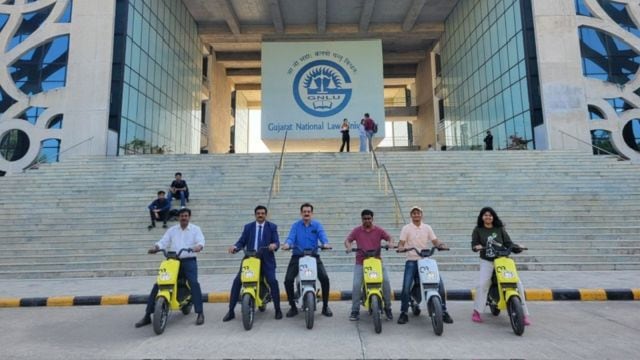How an electric scooter startup serves up solution for Gandhinagar’s last-mile connectivity woes
White Carbon's electric scooter rental service has quickly gained popularity among students at Gujarat National Law University and other institutions, as well as gig workers.
 White Carbon, a local electric bike startup deployed single-seater vehicles at the Gujarat National Law University (GNLU) and other campuses, where they have quickly gained popularity and high demand. (Express photo)
White Carbon, a local electric bike startup deployed single-seater vehicles at the Gujarat National Law University (GNLU) and other campuses, where they have quickly gained popularity and high demand. (Express photo)Gujarat capital Gandhinagar is a well-planned city, similar to Chandigarh, but it has struggled to establish a reliable public transport system that ensures last-mile connectivity. Recognising this opportunity, White Carbon, a local electric bike startup deployed single-seater vehicles at the Gujarat National Law University (GNLU) and other campuses, where they have quickly gained popularity and high demand.
Manthan Parekh, a final-year BA LLB honours student at GNLU, shares how easy it has become for him to commute in the capital, which is now home to several leading universities. He booked a scooter from White Carbon on January 14 with two of his friends. Since it was a holiday for Makar Sankranti, they rode to the international kite festival at the Sabarmati Riverfront in Ahmedabad. They had lunch at a restaurant, spent some time at a mall, and then returned to their campus in Gandhinagar at the end of the day, paying Rs 190 per bike.
“Even if we had hired a cab service or Rapido bike, we would have had to pay much more than this. Besides being cost-effective for students, it was also fun with friends,” he tells The Indian Express.
The distance between Ahmedabad and Gandhinagar is approximately 30 km. Although there is a Metro service and a double-decker bus service connecting the two cities, students and residents express their dissatisfaction, stating that these services only operate along the main road. Consequently, they are not helpful for small errands such as grocery shopping, purchasing emergency medications, or socialising with friends on weekends.
Pragya Kanth, a third-year student from out of town at Pandit Deendayal Energy University (PDEU) in Raysan, on the outskirts of Gandhinagar, spends over Rs 200 for even the shortest trips to buy groceries.
She explains, “The recent Metro service that started from right outside our campus doesn’t meet our needs as students. The waiting time is one hour, and the last trip is at 6.30 pm. Additionally, there are limited areas connected by the Metro, no provision for last-mile connectivity, and to reach Ahmedabad, we have to change trains at various stations. While it may be cheap, it is not convenient for us,” says the 20-year-old.
The Gandhinagar-Ahmedabad Metro, operated by the Gujarat Metro Rail Corporation (GMRC), features eight train stations including GNLU, PDEU, and GIFT City. GIFT City houses the Australian Deakin and Wollongong offshore campuses, as well as the Gujarat Biotechnology University, which is run in collaboration with the University of Edinburgh.
Speaking to The Indian Express, Gandhinagar Municipal Commissioner J J N Vaghela says, “Currently, the Metro service is functioning well in these areas, particularly in the Knowledge Corridor, which serves the premier institutes. Since it is still in the trial run phase, the frequency and operations are limited, but these will be increased over time. At this moment, there is no need for additional public transport in these areas.”
Regarding last-mile connectivity for Metro stations, Vaghela says, “Stations should be located at a distance of at least 500 meters to one km, allowing users to walk this distance. This is why the initial plans did not include provisions for parking spaces at Metro stations. We have yet to fully understand the concept of the Metro.”
But for students like Kanth and Parekh, riding a bike is more convenient. Parekh shares that the friends also enjoyed a “fun ride” to GIFT City at night on the kite-flying holiday. “It’s not that I had never been to GIFT City before; I have cycled there several times. However, riding an electric vehicle (EV) at night with friends was a completely different experience,” he explains. He also mentions how the bike helped him fetch medicines for a fellow student from a pharmacy in Bhaijipura.
Ideal for gig workers, students
White Carbon was launched in 2020 by Pratik Singh Sankhla, 32, and Rushabh Maniar. The company manufactures the O3 micro-mobility vehicle for rental purposes at the Gujarat Industrial Development Corporation (GIDC) estate in Gandhinagar. White Carbon has two charging stations located in Palaj and Sector 1, Gandhinagar. Additionally, the GNLU and the International Automobile Centre of Excellence (iACE) have their own solar charging facilities on-site.
The service provider, equipped with 25 compact, eco-friendly electric vehicles designed for short-distance travel, seems ideal for gig workers, students, and corporate employees. It started out with stations-Kudasan and International Automobile Center of Excellence (iACE)-located within a distance of 5 km in February 2024.
On January 10 this year, White Carbon launched its electric scooter rental services in the GNLU with ten vehicles. “In a week, we gave over 300 free rides to students of the GNLU, and we completed over 200 paid rides. With such a response among students, we are adding another 30 vehicles by the end of this month and another 10 at iACE. So by the end of January, we will have a fleet of 86 vehicles in Gandhinagar,” Sankhla, a mechanical engineer with a master’s in machine design, told The Indian Express. Sankhla has eight years of experience in the EV industry while Maniar was his colleague in an EV manufacturing company.
In the last eleven months, since White Carbon began offering rental services in Gandhinagar, it has covered 16 lakh km and over 900 rides every month as more than 300 riders have tried and used the paid service. Among regular users are 163 gig workers, 88 students from GNLU and nearby universities like National Forensic Science University (NFSU), National Institute of Fashion Technology (NIFT), Dhirubhai Ambani Institute of Information and Communication Technology (DAIICT), Institute of Hotel Management (IHM) as well as employees from Google, TCS and other MNC employees users on weekends.
The rental service offers fares starting at Rs 50 for one hour, extending to Rs 290 for students and Rs 250 for gig workers for 24 hours. The operations are managed by 12 staff members working in three shifts, 24/7. Additionally, around 15 field marshals are responsible for monitoring violations and preventing vandalism of vehicles. This initiative has quickly become a popular choice.
“After using it for the first time, I was so excited that I marketed it to all my friends. If I am travelling slowly and solo, I should not be going alone. So now in the evenings we ride in groups for utility and fun as well. Now I am using it more than thrice a week with an increased frequency on weekends,” says Kanth.
The shortcomings of Gandhinagar’s public transport infrastructure
The public transport infrastructure in the Gandhinagar urban area, which mainly serves bureaucrats and politicians, has primarily been designed with government employees in mind. Recently, the Gujarat State Road Transport Corporation (GSRTC) launched an electric double-decker bus service just a few days before the Vibrant Gujarat Summit 2024. This service operates daily between Sarkhej in Ahmedabad and GIFT City and Gandhinagar Pathikashram and GIFT City, excluding the second and fourth Saturdays and Sundays when government offices are closed.
The connectivity offered by the GSRTC and the city bus service provided by the Gandhinagar Municipal Corporation does not extend to the internal roads within Gandhinagar city. Additionally, areas such as Randheja, Kudasan, Raysan, Pethapur, and other recently incorporated villages are also not covered.
The Gandhinagar Urban Development Authority (GUDA) launched a bicycle-sharing service in 2016, but it was later discontinued. Currently, the GMC has no plans to introduce a similar service for city commuters.
“White Carbon saw problems faced by these people, which are very common, but everyone seemed to have accepted that there is no solution to this. Like a gig worker who is not a graduate, they don’t have a good CIBIL score and don’t have proper residence as many come from nearby states. They are not eligible for a loan, but they came this far to work, and all they needed was a vehicle. We provide the solution to that. The same goes with students; major university students are from different states, and for local commutes, they depend on cabs or auto rickshaws, which charge them extremely high. They have been at their university for years, so they don’t buy new vehicles, so renting is always a good option for them,” Sankhla says.
With a big push to the development of GIFT City, boosting the development of surrounding areas, people are commuting from different states for food and to buy basic groceries. They also face the same problem. “There is a trend in corporations that people switch jobs in search of better opportunities or to get close to their family; not everyone is looking to buy their basic commute. So we brought these solutions,” he adds.
The data maintained by the company indicates that the overall number of users increased organically by 28 per cent before the introduction of e-bikes at the GNLU. However, after that, the demand surged dramatically by 115 per cent. Students typically book the service for either 1-3 hours, while employees tend to book it for 6-12 hours.
“Among students this is popular mostly in the evenings when their classes get over. On the other hand, employees’ peak hours are mostly on weekends and they take it in the evening or for the full day to finish their work,” says Sankhla.
The startup aims to expand to universities in Gandhinagar, promoting sustainability in educational institutions and providing a reliable green mobility solution for students and staff as first and last mile connectivity.
“White Carbon has signed a MoU with the International Automobile Center of Excellence (iACE) and we plan to collaborate with other organisations to further grow its footprint in Gandhinagar first. First we want to cover all the touch points of Gandhinagar and GIFT City through continuous innovation in electric vehicle solutions for all types of users. We aim to be a key player in transforming urban mobility through electric vehicles and contribute to reducing carbon emissions while offering efficient, cost-effective transportation solutions,” says Sankhla.












